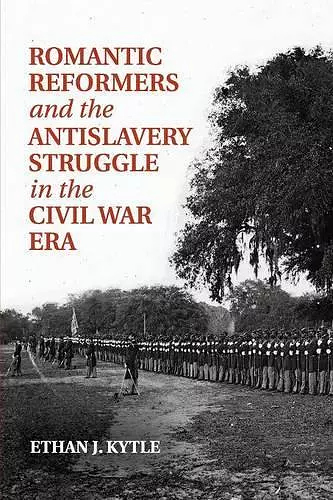Romantic Reformers and the Antislavery Struggle in the Civil War Era
Format:Paperback
Publisher:Cambridge University Press
Published:10th Mar '16
Currently unavailable, and unfortunately no date known when it will be back
This paperback is available in another edition too:
- Hardback£66.99(9781107074590)

Romantic Reformers is an intellectual history of the American antislavery movement in the 1850s and early 1860s.
On the cusp of the American Civil War, a new generation of reformers, including Theodore Parker, Frederick Douglass, Harriet Beecher Stowe, Martin Robison Delany and Thomas Wentworth Higginson, took the lead in the antislavery struggle. Frustrated by political defeats, a more aggressive Slave Power, and the inability of early abolitionists like William Lloyd Garrison to rid the nation of slavery, the New Romantics crafted fresh, often more combative, approaches to the peculiar institution. Contrary to what many scholars have argued, however, they did not reject Romantic reform in the process. Instead, the New Romantics roamed widely through Romantic modes of thought, embracing not only the immediatism and perfectionism pioneered by Garrisonians but also new motifs and doctrines, including sentimentalism, self-culture, martial heroism, Romantic racialism, and Manifest Destiny. This book tells the story of how antebellum America's most important intellectual current, Romanticism, shaped the coming and course of the nation's bloodiest - and most revolutionary - conflict.
'In this stunningly original work, Ethan J. Kytle uncovers the critical connection between romanticism and the antislavery crusade of the 1850s. Based on a deep reading of archival sources and bristling with fresh insights, Romantic Reformers and the Antislavery Struggle in the Civil War Era reveals how these abolitionists blended the perfectionism of an earlier generation with sentimentalism and martial heroism. Sophisticated and elegantly written, it is a stimulating and altogether absorbing book.' Douglas R. Egerton, author of Year of Meteors: Stephen Douglas, Abraham Lincoln, and the Election That Brought on the Civil War
'Ethan Kytle's adept and sympathetic recapitulation of the lives and thought of five antislavery figures is collective biography at its best. His book makes the most convincing case for the significance of abolitionist romanticism in the coming of the Civil War and Emancipation.' Manisha Sinha, author of The Slave's Cause: Abolition and the Origins of American Democracy
'Ethan J. Kytle focuses on five prominent figures - Theodore Parker, Frederick Douglass, Harriet Beecher Stowe, Martin Robison Delany, and Thomas Wentworth Higginson - with a chapter devoted to each. Although the scholarly literature on these subjects is substantial, Kytle is able to accomplish much. First, his writing is refreshingly lucid, and the organization well honed. Second, the selection of these five individuals allows not only for a close biographical analysis but also comparisons with their contemporaries in the decades spanning the Civil War … With deft integration of the copious historiography and primary sources, Kytle is able to provide fresh perspectives on seemingly familiar topics.' Lawrence B. Goodheart, Journal of American History
'Romantic Reformers [and the Antislavery Struggle in the Civil War Era] fulfills its promise to delineate the various ways in which romanticism, 'America's most important intellectual current', was strategically and thoughtfully deployed by second-generation abolitionists during the 1850s … It offers a valuable and lively contribution, for scholars and students alike, to the scholarship of antebellum American history and literary studies as well as to the expanding genre of reform biography.' The Journal of the Civil War Era
'… an interesting, well-written, and engaging collective biography that challenges long-held assumptions about the pacifist and apolitical nature of abolition in nineteenth-century America. [This book] is sure to be an attractive option for instructors to assign in introductory surveys and upper-level seminars.' Suzanne Cooper Guasco, American Historical Review
'For the lay student of the American history, abolitionism begins with the tepid gradualism of the founding generation, is followed by the emigrationism of the American Colonization Society, and culminates in either the radical, though effectively pacifist immediatism of William Lloyd Garrison or the violence of John Brown. Ethan J. Kytle lends nuance to this narrative with his exploration of the ideological background and the moral impetus of the generation of abolitionist who came of age in the 1840s and 1850s and drew on romantic ideals … In this regard, Kytle adds significantly to our understanding of American abolitionism on the eve of the Civil War.' Jason Stacy, The Journal of Southern History
ISBN: 9781107426986
Dimensions: 230mm x 155mm x 20mm
Weight: 490g
314 pages